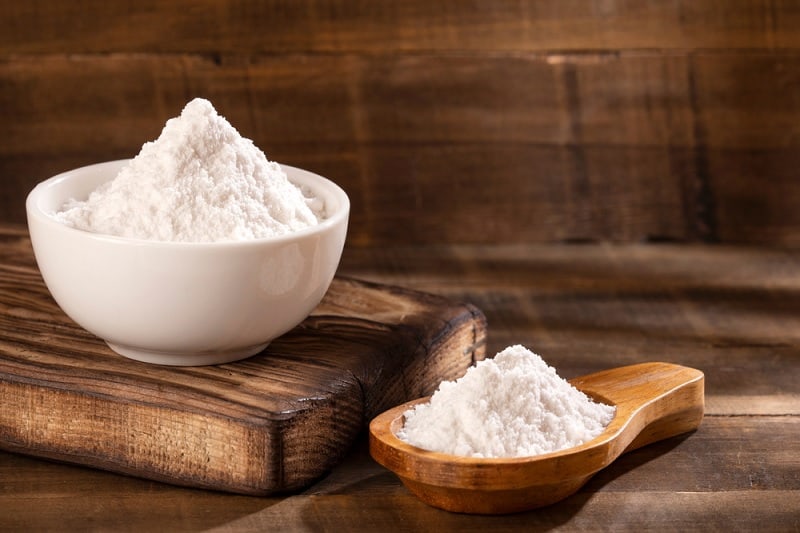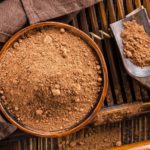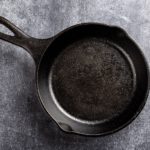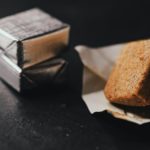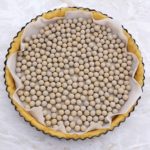If you do a quick internet search for “aluminium free baking powder”, you will find a host of results.
A number of brands sell baking powder that does not contain aluminium, and these products are often clearly labelled as being free of the metal.
Schwartz, for example, offer a clearly-labelled, aluminium-free baking powder (available on Amazon.co.uk here).
Other brands you can find on Amazon and other online stores offering aluminium-free baking powder include Gefen and Doves Farm Baking Powder.
I also took a quick look at some baking powder labels from supermarkets and other brands.
Dr. Oetker Baking Powder does not contain E521 or E541 (aluminium additives) on the label, but it does have E500 (which are rising agents made from sodium carbonates, not aluminium).
According to Dr. Oetker, neither aluminium nor aluminium compounds are added intentionally during the manufacturing process of their baking powder. Any aluminium content would be naturally occuring and would be at levels less than 200 ppm (parts per million).
I also did not find E521 or E541, or any other aluminium names, on the following:
- Waitrose Cooks’ Ingredients Baking Powder
- Asda Baking Powder
- Sainsbury’s Baking Powder
What Does it Mean When Baking Powder Is Aluminium Free?
When baking powder is labelled as being aluminium free, it simply means that the powder does not contain aluminium.
Aluminium in food is usually labelled as an e-number called E541, or sodium aluminium phosphate. It can also be labelled as E521, or aluminium sodium sulphate/sodium aluminium sulphate.
Why Is Aluminium Added to Baking Powder?
Aluminium in the form of sodium aluminium phosphate is added to baking powder to cause the rising product to activate as soon as it has come into contact with heat.
This means that the bread dough (or whatever you are making) will start to rise when you put it in the oven or another hot environment.
Baking powders that do not contain aluminium are not heat activated. Instead, they are moisture or liquid activated. Because of this, aluminium-free baking powder requires faster hands. It activates and gets to work, releasing the gases and starting the rising process, as soon as you add any kind of moisture with it.
Aluminium-free baking powder is often called fast-acting baking powder.
Baking powder that contains aluminium is often referred to as slow-acting baking powder.
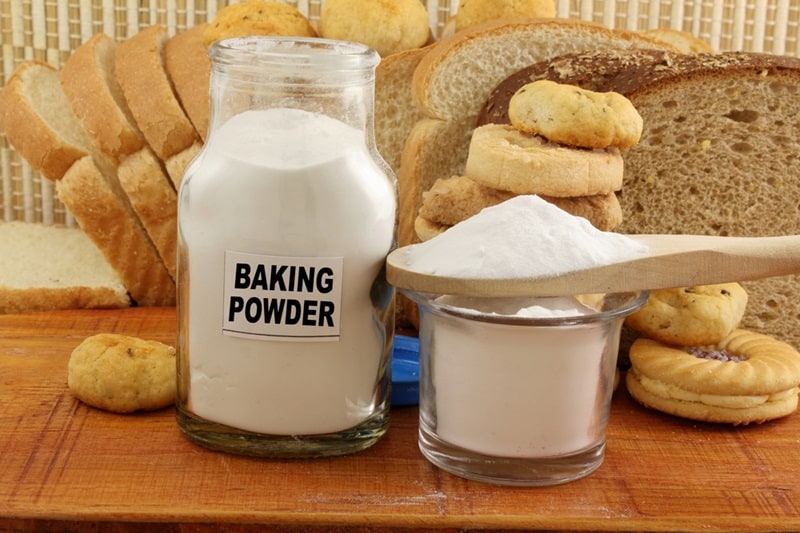
Is Aluminium in Baking Powder Bad for You?
There seems to be a rather hot debate on whether or not aluminium in baking powder (and other food/health products) is bad for you.
Some believe that aluminium in food and other products, such as antiperspirants, can increase your chances of suffering with medical conditions like Alzheimer’s disease. However, since the amounts of aluminium you are exposed to from these products is so small, it’s not clear that they pose a serious danger.
The quantities of aluminium in food and other products are often incredibly minimal. It can be found, in various forms, in all sorts of food products that you may not know about. This includes certain food additives, medications you’d take to treat heartburn and indigestion, hot chocolate and other hot drinks, self-raising flour (and other types of flour), and even some cheeses and cheese products.
Saucepans and frying pans, and other food containers and tins, can cause trace elements of aluminium to be left in your food.
Antiperspirant and deodorant can also cause the body to come into contact with aluminium.
Even fruits and vegetables that come straight from the ground have trace elements on aluminium in them. It is a naturally occurring metal that is found in and on the planet itself.
It is thought that you would need to come in contact with large quantities of aluminium on a regular basis to experience side effects typical with aluminium exposure. As with most things in life, if you have a healthy and balanced diet, eating things in moderation, you shouldn’t experience any problems.
The UK Food Standards Agency have E541 (Sodium aluminium phosphate) and E521 (Aluminium sodium sulphate) on the approved (and safe) list of additives and E-numbers.
There is nothing to stop you from avoiding baking powder and other products that contain aluminium, however. That is a personal choice that you can make.
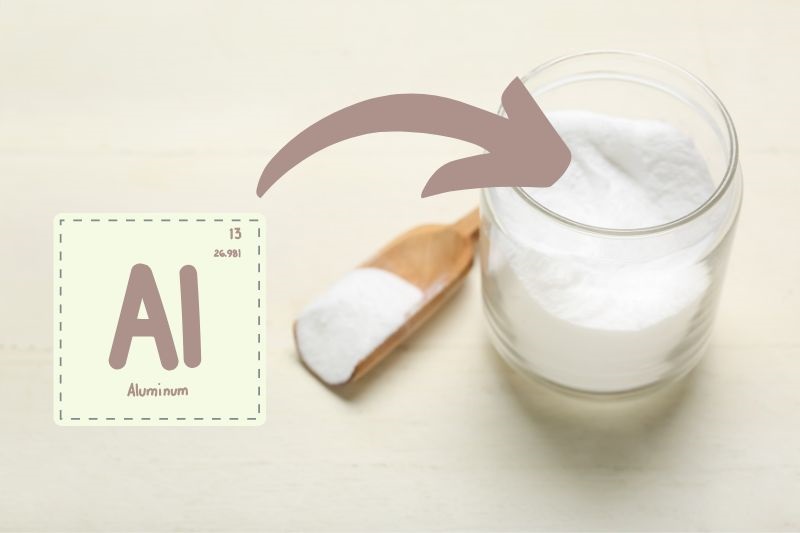
Can You Taste Aluminium in Baking Powder?
Some people can’t taste the difference between baked goods made with aluminium-free baking powder and those made with baking powder that contains aluminium.
Other people, on the other hand, can taste a metallic twang in cakes and other baked goods. It can leave reportedly infuse a mildly unpleasant, almost-bitter taste into food.
Some people have complained that the aluminium in baking powder also alters the colour of finished baked products, turning them a light grey or purplish shade.
Does Double-Acting Baking Powder Contain Aluminium?
Yes, double-acting baking powder is likely to contain aluminium.
As previously mentioned, baking powder products with aluminium are slower-acting. They activate with heat. Baking powder products without aluminium are faster-acting. They activate with moisture or liquid.
Double-acting baking powder contains both – heat-activating and moisture/liquid-activate compounds. Because it is heat-activating, it is likely to contain sodium aluminium sulphate.
However, some brands of double-acting baking powder do not contain aluminium. Schwartz All Natural Baking Powder, available on Amazon, is a prime example of this.
If you want my advice: always check the label!
How to Tell if Baking Powder Contains Aluminium
Baking powder that does not contain aluminium is usually labelled as such. That’s not always the case, however. Checking the label can give you more information.
If you see the following ingredients or E-numbers in the ingredient list, the baking powder does contain aluminium:
- E541
- Sodium aluminium phosphate
- E521
- Aluminium sodium sulphate
- Sodium aluminium sulphate
How to Make Your Own Aluminium-Free Baking Powder
You can easily make your own baking powder at home, with a few simple ingredients, ensuring that it is aluminium-free.
The Spruce Eats has an easy homemade baking powder recipe.
You will need the following:
- Bicarbonate of soda (baking soda) – 1 part
- Cream of tartar – 2 parts
- Corn starch – 1 part (for longevity/optional)
You simply mix the three ingredients together well. You may also wish to pass the ingredients through a sieve, to get out any lumps or bumps.
If you are planning on using all of your baking powder in one go (and not storing it the leftovers) you will not need to add corn starch. It is added for safe storage, preventing waste.
You can keep your homemade, aluminium-free baking powder for approximate four to six weeks, in an airtight container, in a cool and dark place. After this point, the mix will not rise well during cooking.

Kim is a writer with more than a decade of experience, and a food enthusiast. When she’s not spending her time writing about her favourite dishes, you can find her in the cake aisle of her local supermarket, or making a mess in the kitchen.

